'Incredible things outside Silicon Valley': Why tech start-ups are flocking to Dubai
The United Arab Emirates’ AI investments and pro-business policies are drawing more foreign tech firms. Its neutrality in the US-China AI race is a plus, some firms say.

Mr Carlton Liew (right), chief business officer and co-president of Singapore-headquartered Dyna.Ai, with an investor at the Fintech Surge event in Dubai. (Photo: Dyna.Ai)

This audio is generated by an AI tool.
DUBAI: They met as knowledge engineering masters students at the National University of Singapore.
Spotting a gap between what was taught in university and what the industry was looking for, Mr Pranjal Dubey, Mr A. M. Aditya and Mr Desmond Sek decided to launch Xaltius Academy in Singapore in 2017 to offer training in data science, software engineering, cybersecurity and generative artificial intelligence (AI).
Mr Pranjal and Mr Aditya are Indian citizens while Mr Sek is Singaporean.
Four years ago, they sought to expand abroad and decided to head to Dubai, a cosmopolitan emirate of the United Arab Emirates (UAE) in the Middle East.
“Dubai is a place where the government is also pushing a lot of initiatives in terms of upskilling and reskilling … it’s a good market,” said Mr Pranjal, 35.
Attracting and training talent for jobs enabled by AI is one of the aims of the UAE’s National Strategy for AI 2031.
Xaltius’ co-founders also saw how its government was driving digital transformation and attracting more talent and companies, such as through a “golden visa” long-term residence scheme.
The golden visa is awarded for either five or 10 years and is open to investors, entrepreneurs and those with specialised skills, such as doctors and scientists.
While Mr Pranjal feels Singapore’s business processes are more “streamlined” and that the city-state has a more systematic approach to doing things, “Dubai is more global as compared to Singapore”.
“Because of its geographical location, it’s kind of in the centre (of the world),” he said.
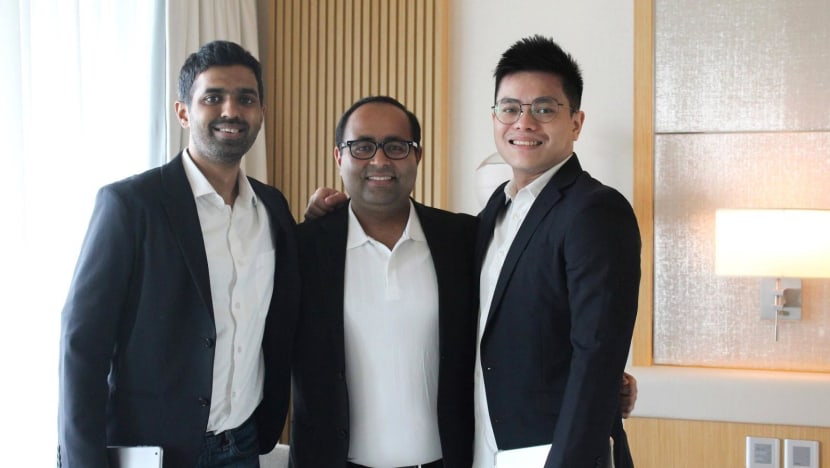
The UAE, one of the Middle Eastern countries banking on AI to diversify their economies from oil, has also kept a “neutral” stance in the AI race between the United States and China, he noted.
The US has sought to curb China’s access to high-end chips and other advanced technologies that could help it develop critical technologies for a military edge.
While the big-power rivalry has had no impact on Xaltius, Mr Pranjal said: “Being a training company, we always target places or regions which are kind of neutral.”
Drawn to a business-friendly environment and opportunities in sectors like finance, healthcare and education, more Southeast Asian tech firms are heading to the UAE and other Middle Eastern countries.
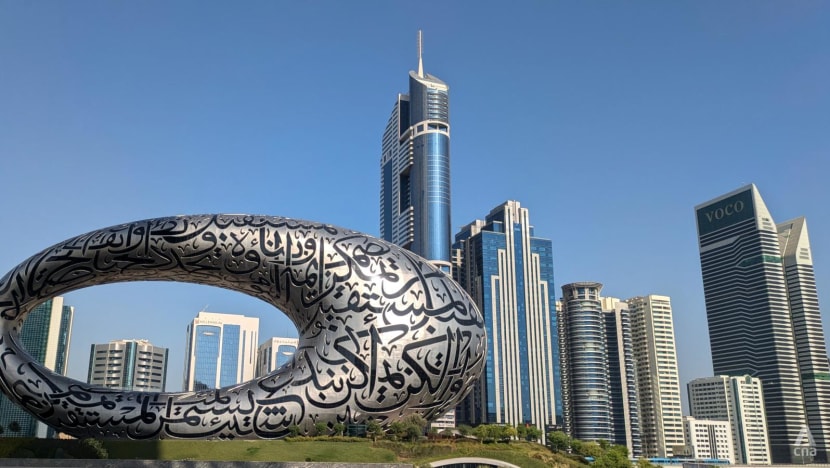
Over two dozen Southeast Asian tech firms have expanded to the Middle East, with fintech firms such as Singapore-headquartered Ant International, which is part of Chinese fintech giant Ant Group, leading the way, the media and events platform Tech in Asia reported in July.
The UAE, Saudi Arabia and Qatar, in particular, have demonstrated strong commitment towards the development and implementation of AI technologies, according to professional services firm PwC.
It expects AI to add US$320 billion to the Middle East’s economy by 2030, with Saudi Arabia and the UAE to see the largest gains of US$135.2 billion (12.4 per cent of gross domestic product) and US$96 billion (13.6 per cent of GDP), respectively.
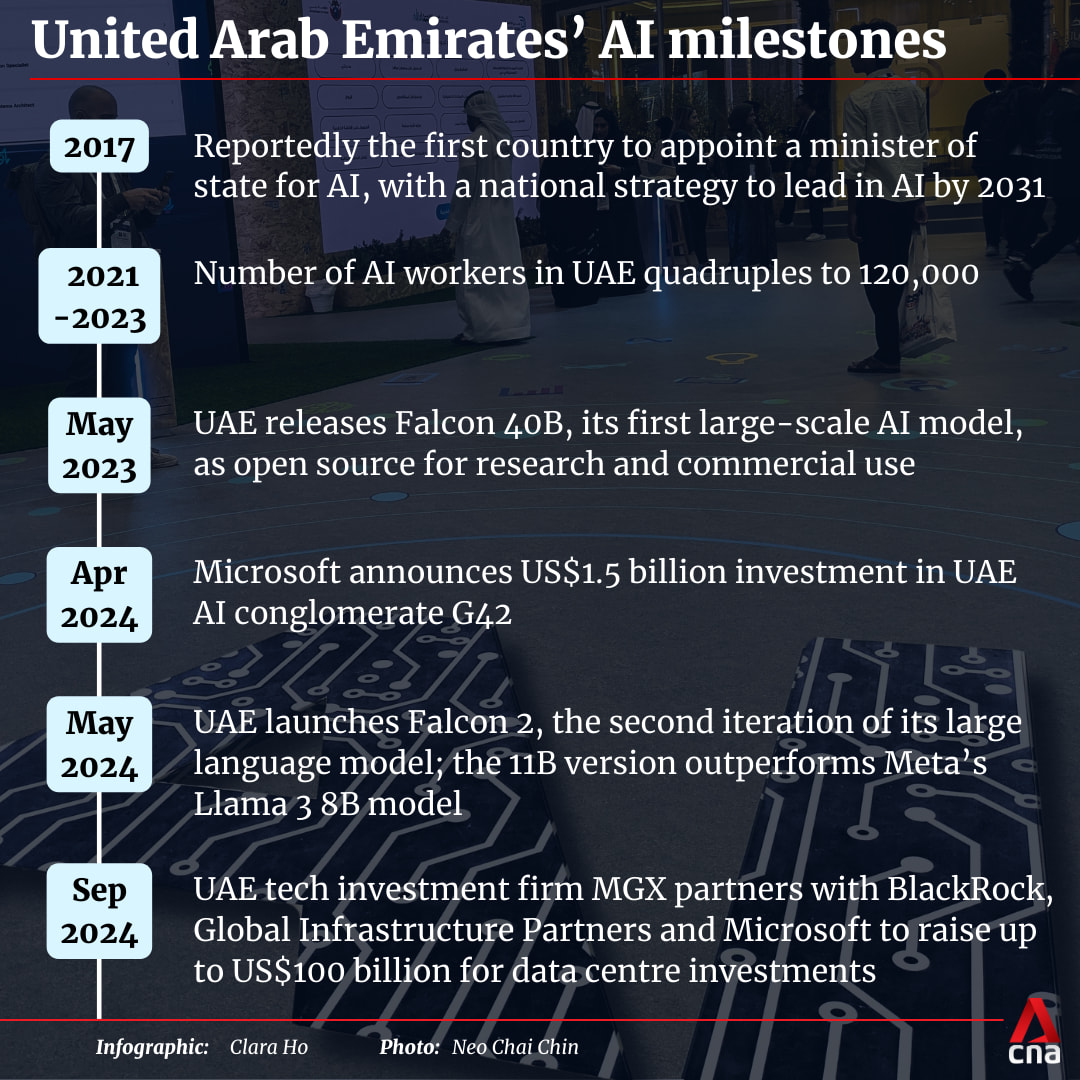
"A LOT OF GROWTH AND INVESTMENT HAPPENING"
Southeast Asian firms and other tech start-ups in the UAE say it is easy to start a company there, and the country offers good infrastructure and generous financial support.
The UAE’s golden and other visas to draw talented individuals and their families are attractive, they add.
After setting up its Singapore headquarters in March this year, AI solutions start-up Dyna.Ai opened in the UAE about two months ago, said its chairman Tomas Skoumal, 49, who is Czech.
The ease of setting up the company in Dubai was “almost the same”, he said.
The Middle East is one of the three regions the company is focusing on, besides Southeast Asia and Latin America. This is because Spanish and Arabic are among the world’s most widely spoken languages, while Southeast Asia is where Dyna.Ai’s headquarters sit, he explained.
Dyna.Ai’s AI platform comprises multiple large language models and text-to-speech models that are trained for financial institutions but are also applicable to other businesses.
Mr Skoumal, who spent over two decades in banking, believes AI-driven communications will help financial and other institutions serve their customers better, faster and with more relevant products in the near future.
“Because (the platform) can do not only communication. We also do the evaluation of the customer, risk evaluation, anti-fraud evaluation, propensity to buy, sensitivity to price,” he said.
Customers would not need to repeat themselves when they try to resolve issues, as “AI will remember” what they said previously, he added.
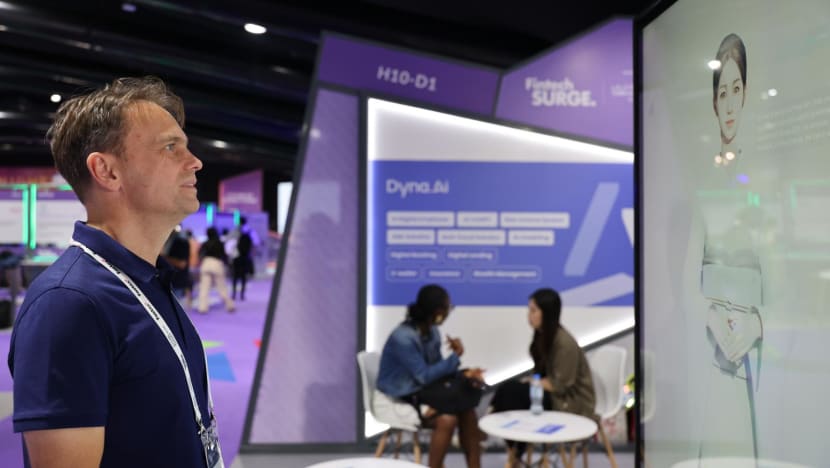
Dyna.Ai participated in Expand North Star, a major event for start-ups and investors in Dubai last month, and Mr Skoumal said it is in talks with “quite a few banks” as well as potential customers from other industries.
“The banks are saying ‘wow’. They like it, but then obviously when we discuss how to implement it, we have to test it,” he said. “Because banks are very rigid, they are very slow because they have to be; regulators are forcing them to be.”
Malaysian analytics firm The Decision Labs also participated in Expand North Star, with costs covered by an Abu Dhabi-based startup accelerator.
The Decision Labs founder and chief executive Anupam Chatterjee, 43, opened a company in Dubai earlier this year because he wanted to explore opportunities in the UAE, Saudi Arabia and Qatar.
The Decision Labs offers healthcare providers platforms for digital patient feedback, real-time complaint management and query management, and already has clients in Malaysia, the Philippines, Indonesia, Vietnam, Oman and Bahrain.
It uses AI for scenario simulation, issue categorisation and workflow generation, and pre-emptive triggers to the quality manager if an abnormal number of complaints in a certain category or a pattern is observed.
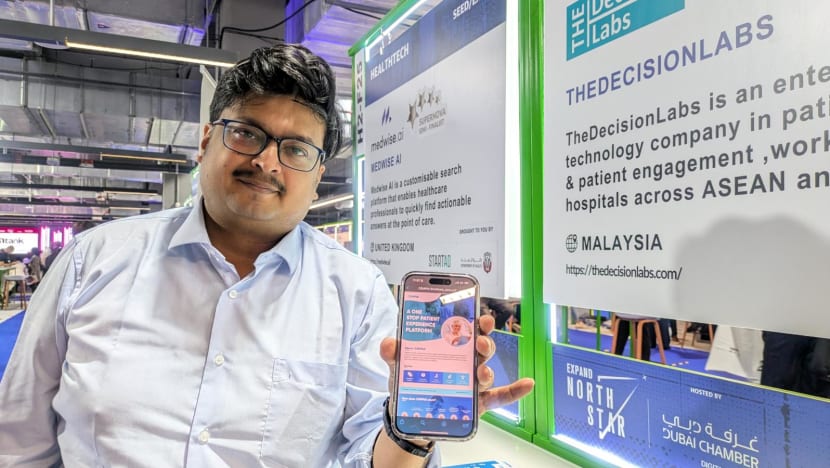
In Dubai, it works with a local partner that has experience with hospitals and the health authorities of Dubai and Abu Dhabi, the latter being the UAE’s capital and largest emirate.
“It’s good to have experienced partners in the region,” he said. "I think both in Southeast Asia and Middle East, there’s a huge amount of trust and personal relationships which matter.”
After presenting at a conference in Abu Dhabi in May, The Decision Labs was invited to try for a place in a biotech and life sciences start-up programme called HealthX. It succeeded and gained connections to local hospitals.
“There is a lot of growth and investment happening in Saudi Arabia, in UAE and in Qatar. The entire digital transformation, especially in healthcare, is happening as we are speaking,” said Mr Anupam.
For instance, he was recently encouraged during a private discussion with an official at a UAE government institution to set up a biotechnology company, and understood that there were investors ready to finance it.
“They are ready to onboard the best talents, be it from Singapore, from the US, the UK, from the top universities,” said Mr Anupam, who is an Indian citizen and in Dubai on a general manager visa.
He is trained in quantitative economics and has a master of business administration from HEC Paris and MIT Sloan School of Management.
His team currently consists of about 18 people in Bangalore, Malaysia and the Philippines, and he plans to hire his first employee in the UAE when The Decision Labs officially signs on a project there.
SINGAPORE, DUBAI CAN LEARN FROM EACH OTHER
Singapore and Dubai have been described as competitors by some observers, given their status as aviation hubs, financial centres, gateways to their respective regions and their ambition to be tech and start-up hubs.
But others beg to differ.
“They are so geographically far away that I don't think they should be competitors,” said Mr Skoumal of the two cities, which are a seven-and-a-half-hour flight apart.
“They don't fight for the same customers. They don't fight for the same companies. They have their own markets,” said Mr Skoumal.
“I feel like they can learn from each other, and I guess they are doing it,” he said, citing both cities’ efforts to digitalise government systems.
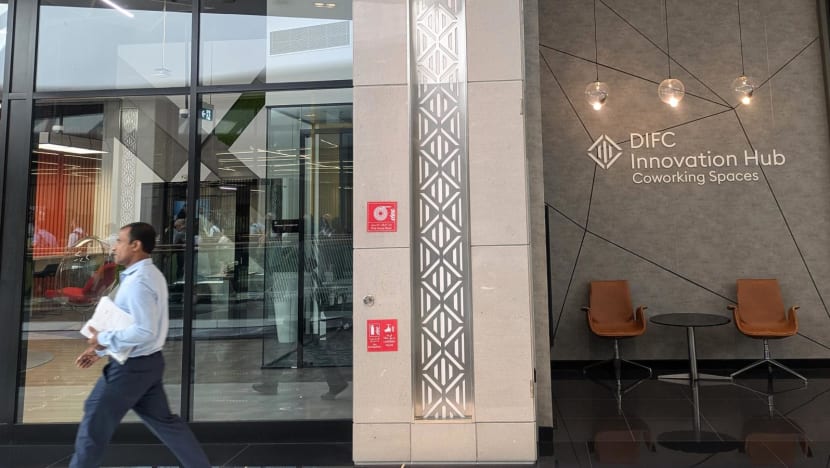
Dubai residents may access 280 services offered by government and private entities on the government’s DubaiNow app, which has an AI digital concierge to help with queries.
The Digital Dubai Authority has adopted AI in myriad ways, from identifying employee development opportunities to tender evaluation – scanning hundreds of pages of each proposal, and producing summaries and scores – in the procurement process.
Dubai announced last month that its airports would use AI facial recognition cameras to scan travellers’ faces while they are on the move, identifying them and officially registering their arrival or departure at the passport control area.
This would eliminate the need for them to stop and show their travel documents, Gulf News reported.
Last week, Abu Dhabi’s crown prince Sheikh Khaled Bin Mohamed Bin Zayed Al Nahyan made a two-day official visit to Singapore. He met Singapore Prime Minister Lawrence Wong and both sides signed agreements on AI talent development and other areas.
WILL UAE-US’ AI MARRIAGE BE “MONOGAMOUS”?
Just as Southeast Asia has had to navigate US-China rivalry in areas like clean technologies and infrastructure development, the UAE has needed to do so in AI.
UAE AI conglomerate G42, which is chaired by Emirati national security advisor Sheikh Tahnoon bin Zayed Al Nahyan, has been at the centre of the US’ efforts to limit China’s influence in the Middle East and ambitions to get ahead in advanced technologies, The New York Times reported.
G42 announced a partnership with American firm OpenAI in October 2023. The following month, the Times reported US agencies were concerned about the extent of G42’s work with Chinese companies such as Huawei that the US considers to be security threats.
In April this year, tech giant Microsoft announced a US$1.5 billion investment in G42. The deal was sealed after negotiations between the US government and G42, which agreed to divest from China and pivot to American technology, Bloomberg reported.
“The US is applying significant pressure on the UAE to abandon its neutrality and choose the US when it comes to tech policy,” said researcher Sam Winter-Levy, a technology and international affairs programme fellow at the Carnegie Endowment for International Peace, a US think tank.
The UAE has said it seeks a “marriage” with the US on AI and appears to have made serious efforts to assuage US concerns about its stewardship of US AI technology, said Mr Winter-Levy.
“It has pledged that it will lock down its data centres, stripping them of Chinese hardware that might have backdoors, screening customers and workers, and monitoring how buyers use their chips,” he noted.
But Mr Winter-Levy is “sceptical any such ‘marriage’ will be monogamous”.
“The UAE has powerful incentives to hedge its bets between China and the US – rationally so, given American domestic political instability and the enduring, if eternally frustrated, US desire to ‘pivot’ to Asia,” he said.
He reckoned the UAE will work with the US on AI because it needs American chips and know-how.
But it will not cut off its broader relationship with China – which is the UAE’s top non-oil trading partner – and will keep trying to hedge its bets between the two states, “playing the major powers off against each other to extract concessions”, he said.
In a visit to Washington in September, UAE president Sheikh Mohammed bin Zayed Al Nahyan affirmed his country’s partnership with the US in advanced technologies and the clean energy needed to power AI.
In a joint statement, they said their collaboration “incorporates safeguards to protect the national security of both countries”.
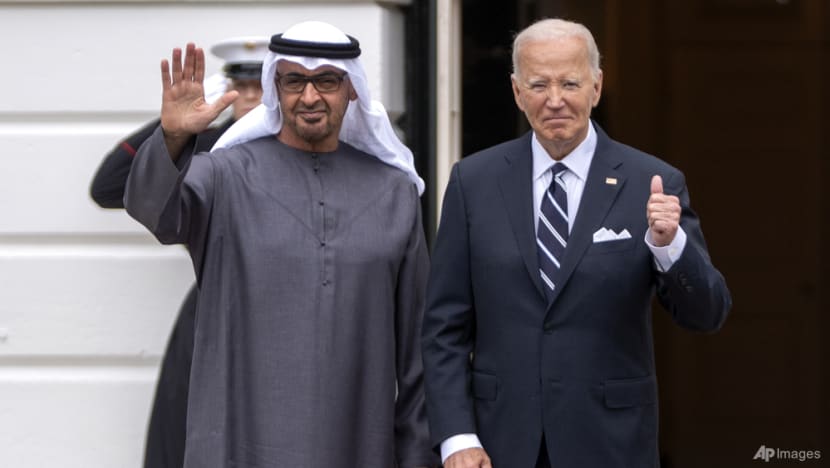
Asked by foreign journalists last month about the UAE’s position in the US-China tech rivalry, Mr Omar Sultan Al Olama, the UAE’s minister of state for AI, digital economy and remote work applications, said it tries “in all domains … to maintain a neutral position”.
However, in technology advancement and development, “the UAE has been a close partner for the US and has been working with the US and American companies for the last 50 years, since our founding”, he said.
“And we’re not going to throw that away today.”
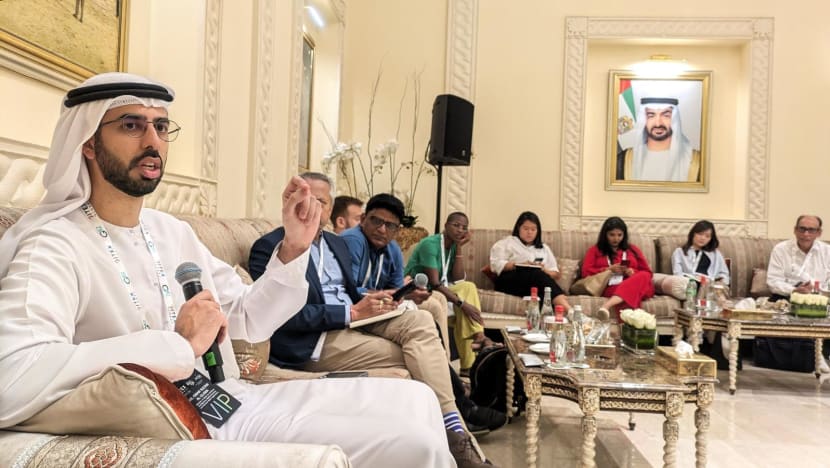
“So, we are going to continuously work with the US and if we can work with China, we are going to work with China,” he told the foreign media including CNA, who were on a press trip organised by the Dubai Department of Economy and Tourism.
“If it upsets the US because of any internal issues, I think we are going to try to work with the US to understand what can be done and what can’t be done, and how we can actually proceed on that, but without losing all of the historical advantages that we’ve had of being a strategic partner to the US.”
BUILDING "INCREDIBLE THINGS" OUTSIDE SILICON VALLEY
Start-ups say they have not felt any impact of US-China rivalry and are leveraging the ecosystem that the UAE and Dubai authorities are building.
When father-and-son pair Avneesh and Akshat Prakash, both Indian citizens, started speech and translation AI company Camb.ai about 1.5 years ago, Dubai’s venture capital fund – the Dubai Future District Fund – put in US$500,000 in pre-seed funding, Mr Akshat said.
The authorities also facilitated Camb.ai “at every step”, helping the co-founders network with customers and investors, said Mr Avneesh.
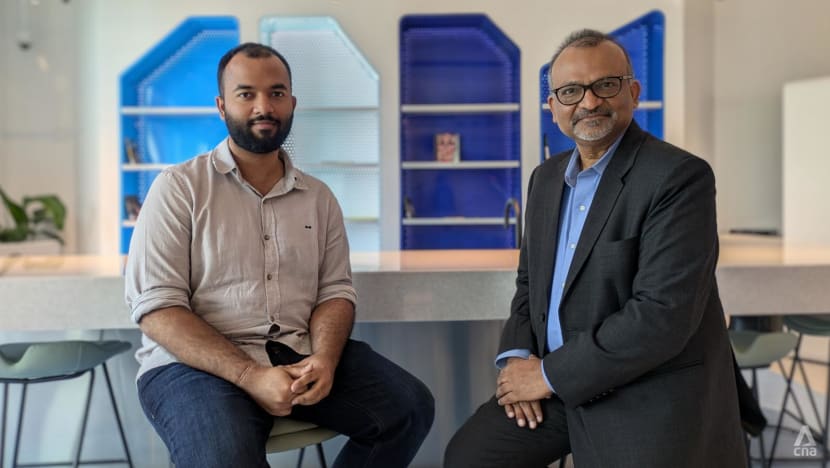
The Dubai AI Campus, where Camb.ai’s office is located, is part of the Dubai International Financial Centre (DIFC), a free zone that allows 100 per cent foreign ownership of companies, has its own financial regulator and is based on English common law instead of the civil and Sharia law in the rest of the UAE.
The AI Campus offers resources such as free cloud credit, super computing power and graphics processing units (GPUs)-as-a-service. GPUs are computing engines integral to AI tasks.
Although Mr Akshat had graduated in computer science from Carnegie Mellon University in the US and worked there for four years, with a stint at Apple before launching his own company in San Francisco’s Bay Area, Dubai was a “pretty natural” choice for Camb.ai.
Mr Avneesh, in his early 50s, had spent his career with tech businesses and had been working and living in Dubai for several years.
Its geographical location – “literally in the middle of the world” – makes it possible for Camb.ai to attract talent in Asia, Europe and Africa, said Mr Akshat, 26.
Dubai is no more than four hours ahead of Europe and Africa, and no more than four hours behind many parts of Asia.
“I think it’s impossible to build an international team sitting in the Pacific Time zone,” said Mr Akshat, referring to San Francisco’s time zone.
"Even though the Bay Area might continue to have some of the best talent out of Stanford (and other universities), they’re unaffordable for a new company.”
Camb.ai’s team of close to 50 people are based all over the world.
Its achievements include partnering MLS NEXT Pro, a professional men's soccer league in the United States and Canada, in April to livestream a match with AI-powered commentary in multiple languages. Its AI dubbing platform instantaneously translated the English commentary into French, Spanish and Portuguese while maintaining the commentator’s voice and tone.
In August, it partnered broadcaster Eurovision Sport to live-dub 50 hours of commentary from French to Portuguese for the 2024 World Athletics U20 Championships.
Start-ups are also helping to draw international investments to Dubai.
The tech platform Stake, for instance, allows people from all around the world to invest in Dubai’s booming property market for as little as 500 dirhams (US$137).
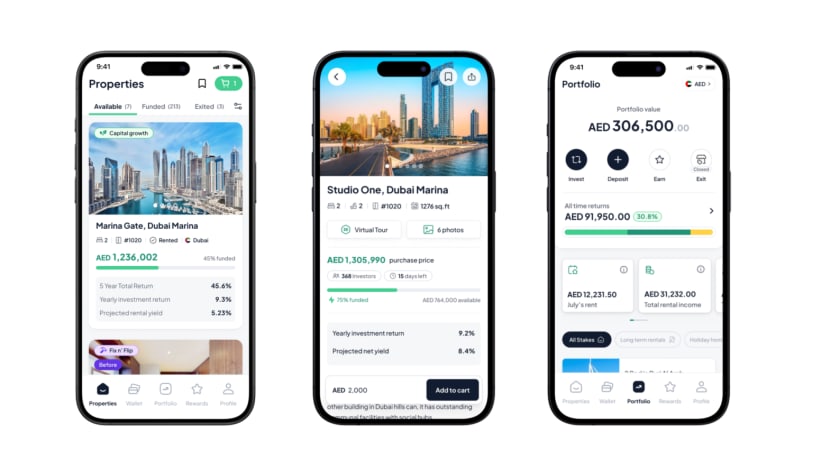
Launched by Mr Rami Tabbara and two co-founders in January 2021, the app has since logged over 800,000 users of over 200 nationalities transacting over half a billion dirhams.
Users pick which properties on Stake that they wish to invest in, and can own a piece of Dubai within three minutes, he said.
Stake is regulated by the Dubai Financial Services Authority and follows its “know your customer” and other rules.
About a year ago, it convinced the UAE government to let it issue golden visas to users who invest at least 2 million dirhams.
“Over 15 people” from Singapore have since snagged golden visas through Stake, said Mr Tabbara, 40, a Lebanese who has lived in Dubai for 20 years.
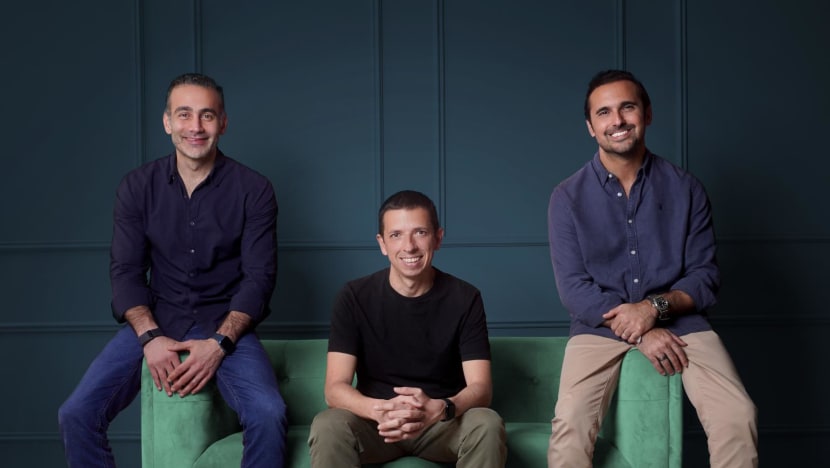
“It’s helped our business massively to be able to issue golden visas,” he said, adding that Stake worked with the government’s Dubai Future Foundation and DIFC on it.
In turn, “we’re able to bring in more investments into Dubai through an app”, he said.
Comparing Dubai, which has developed rapidly in recent decades, to a start-up, Camb.ai’s Mr Akshat said one of the company’s goals one day is to tell people: “You can be outside of Silicon Valley, in new places like Dubai, and build incredible things”.




















